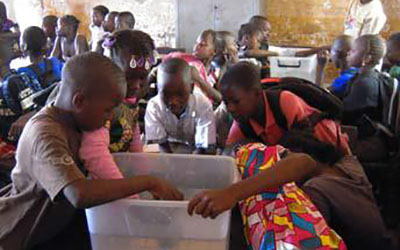Context
In Malian schools, science and health education are often overlooked or given limited space in the curriculum. At the Mérieux Foundation we are convinced that schools have a key role to play in helping children understand and change their behaviors to limit the risk of disease. In 2015 we started this project with the Foundation La Main à la Pâte*, created by scientists who take a hands-on approach to science education using an investigation-based method.
Aim
In addition to preparing future generations of doctors and scientists, improving science education in schools encourages children, particularly girls and young women, to consider scientific and medical careers. When children are aware of the principles behind good hygiene and how diseases are spread, they act as ambassadors, bringing the message home to their families and sharing this knowledge with their communities.
Activities
The pilot program, conducted in seven schools in the city of Bamako, focuses on the topics of water, air and the human body. By giving schoolchildren an opportunity to conduct scientific experiments, it solicits their creativity and independent thinking. At the same time, it gives teachers specific skills and methods to stimulate students’ scientific curiosity and build their knowledge, understanding of the world and the ability to express themselves. The teachers guide the pupils in their discoveries through experimenting and reporting in the classroom.

Beyond the classroom, scientists are invited to visit the schools where they can interact with pupils and teachers. Meetings are organized to provide scientific support for teachers. Special training sessions for teachers are held at the Charles Mérieux Center for Infectious Disease, which also provides scientific support and local coordination.
Results to date
- 224 teachers, 7 schools and 4,500 schoolchildren have taken part in the program
- 9 teacher training sessions have been held
- As a partner to this initiative, the Malian Ministry of National Education has officially integrated the teaching methods into its school curriculum, ensuring their long-term sustainability.
What’s next?
After the success of this four-year pilot, preparations are under way to expand the program to more schools.
Partners are being sought to:
- Increase the number of teachers with training and coaching programs
- Strengthen monitoring of the programs already in place
- Provide schools with more equipment and materials for experiments
- Organize science fairs in schools
- Organize science days with scientific exhibitions by children from the project schools
Partners
Operational
- La Main à la Pâte Foundation*
- The Charles Mérieux Center for Infectious Disease of Mali
- The GABRIEL Network
- The Malian Ministry of National Education
- The Malian Ministry of Higher Education and Scientific Research
Financial
- The initiative is co-funded by Fondation Christophe et Rodolphe Mérieux
*La Main à la Pâte is a French foundation that seeks to develop inquiry-based science education for primary schoolchildren in France and the rest of the world. It was founded by the Academy of Sciences and the Ecole Normale Supérieure in Paris and Lyon.
